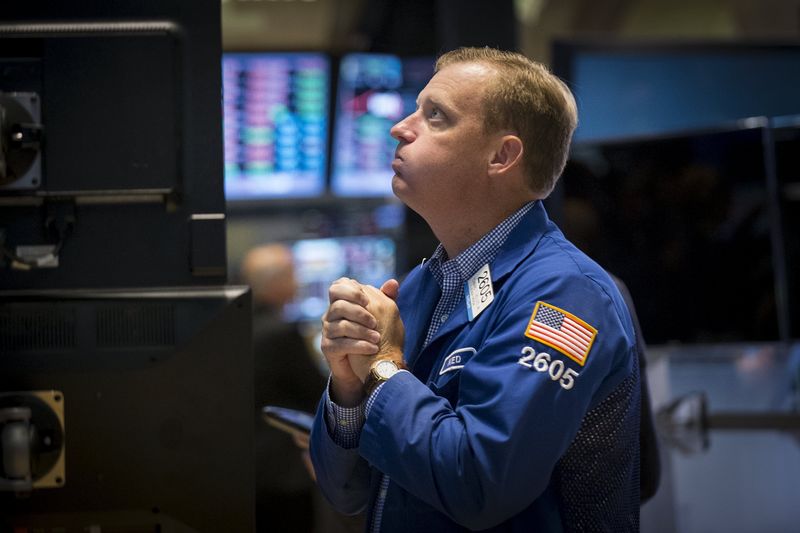There’s likely to be weakness in the Australian market in early trading this morning after US markets faltered, unable to notch a ninth day in a row of gains.
The US dollar also fell to its lowest point in five months, falling against major currencies as markets become more convinced the first interest rate cuts from the US Fed are just around the corner.
US and European markets
Weakness in megacap tech stocks was a core contributor to US losses. Nvidia broke a six-day streak (having risen 25% in little more than a week) to dip 2.1%.
Meta dipped 0.48%, Intel (NASDAQ:INTC) fell 2.46% and Tesla (NASDAQ:TSLA) slipped 0.73%. On the other hand, Microsoft (NASDAQ:MSFT) lifted 0.78%, Amazon (NASDAQ:AMZN) 0.37% and Apple (NASDAQ:AAPL) 0.27%.
Bank of America (NYSE:BAC) fell 2.5% as Berkshire Hathaway (NYSE:BRKa) sold more shares. Lowes dipped 1.2% on down-revised full-year guidance.
Boeing’s troubles continued as the US Federal Aviation Administration set out an airworthiness directive for the aero manufacturer’s 787 Dreamliners after an incident in March caused a sudden drop mid-flight, resulting in 50 injuries.
The stock fell 4.2%, now down 31.64% for the year to date.
Netflix (NASDAQ:NFLX) touched a record high with a 1.5% gain, while cybersecurity firm Palo Alto Networks gained 7.2% on a strong forward outlook and an improved buyback program.
Weight-loss drug Zepbound demonstrated protective effects against the risk of developing Type 2 diabetes in pre-diabetic adults, boosting manufacturer Eli Lilly (NYSE:LLY)'s stock 3.1%.
The Dow fell 0.2% or 62 points, the Nasdaq 0.3% or 60 points and the S&P500 0.2%, prematurely ending what would have been the bourse’s longest winning streak in 20 years according to Dow Jones Market Data.
In Europe, energy stocks demonstrated weakness as oil prices fell. The sector dipped 2.2%, responding to Israel’s acceptance of a proposal to tackle disagreements blocking a ceasefire deal in Gaza, and lessening demand from China.
The Swedish Riksbank cut interest rates by 25 basis points to 3.5%, signalling two more rate cuts to come and driving Swedish shares down 0.5%.
Multinational telecommunications company BT took a 6.4% blow to its stock price as partner and competitor Sky prepares to launch a rival broadband service.
The FTSE300 fell 0.4% and the UK-centred FTSE100 1%.
Currencies and commodities
The US dollar’s weakness boosted all three of our basket of currencies overnight.
The Euro rose from US$1.1072 to a session high of nearly US$1.1130, the Aussie from US67.15 cents to near US67.45 cents and the Japanese Yen from 147.33 yen per US dollar to near JPY145.25 at the US close.
Oil prices fell to a two-week low. Brent shed US46 cents or 0.6% to US$77.20 per barrel and US Nymex US33 cents or 0.4% to US$74.04 per barrel.
Metals were a mixed bag.
Copper fell 0.4% as high inventory levels weighed on prices. Aluminium jumped 2.1% to reach a five-week high as a shortage of alumina in China (who produces 58% of the world’s alumina) and a weakening US dollar drove speculation.
Gold responded to the weakening dollar in kind, lifting US$9.30 or 0.4% to US$2,550.60 per ounce, with spot gold trading near US$2,515 per ounce after hitting an all-time high of US$2,531.60 earlier in the session.
Iron ore fell as Chinese demand for steel continues to weaken, slipping US11 cents, or 0.1%, to US$97.99 per tonne.
On the small cap front
The ASX Small Ordinaries lifted 0.11% yesterday, pacing the ASX200’s 0.19% gain.
You can read about the following and more throughout the day on our website.
